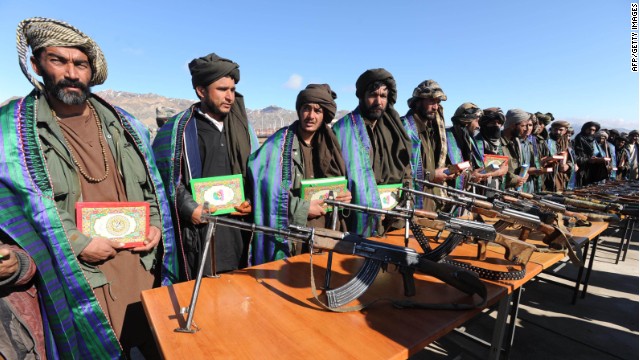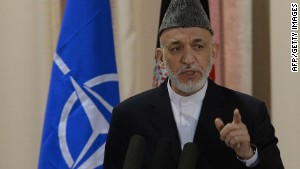Why Taliban would talk as U.S. withdrawal looms
June 19, 2013 -- Updated 0315 GMT (1115 HKT)

Taliban fighters stand with their weapons and Qurans after joining Afghan government forces, on January 30, 2012.
STORY HIGHLIGHTS
- CNN's Nic Robertson assesses why the Taliban would want to talk now
- Possibility of a grand bargain between U.S and Taliban is possible but lots of hurdles remain
- Taliban group agreeing to talks is the one that was in charge of Afghanistan for 9/11 attacks
- Taliban might think that if civil war returns to Afghanistan they may not be successful
Meanwhile, the Taliban told reporters in Doha that they want to improve relations with the world. CNN's Senior International Correspondent Nic Robertson explains what's happening and why now.
What are we talking about?
The Taliban will open an
office in Qatar and begin talks there with Afghan and U.S. officials to
end the fighting in Afghanistan.
Is there a grand bargain to be had?
International
representatives close to the process in the past have told me not to
rule it out. A bargain where the Taliban accept United States bases in
Afghanistan beyond the 2014 pullout date is possible and agree to not
attack them is possible. The same people also say don't hold your
breath, this has been a long time coming.
 Uncertainty marks Afghan handover
Uncertainty marks Afghan handover
What are the demands?
The Taliban must renounce
al Qaeda. In the past, the Taliban have demanded all foreign troops
leave the country and have asked for specific percentages of
representation in the Afghan political and military structures. They
also want their prisoners released from U.S.-controlled detention.
Taliban officials have
said in the past that theirs is a national struggle, and that al Qaeda
has an international agenda. However they would take support where they
could get it. The demand to renounce al Qaeda has been made to the
Taliban since their first tentative "talks" in Mecca, Saudi Arabia, in
2008.
Which Taliban are we talking about?
Mullah Omar's Taliban,
the Afghan leader or Emir of the Islamic Emirate of Afghanistan before
September 2001. His right hand man, Tayyab Agha, heads the Taliban
mission in Qatar. Other principal Taliban and Afghan opposition factions
include the Haqqani faction, the TTP or Pakistani Mehsud faction and
the Hekmatyar faction in the North East.
Those close to Mullah Omar's Taliban say the vast majority of Taliban support him.
International
representatives close to the process say while that may be true,
powerful groups like the Haqqani's could continue an insurgency even if
Mullah Omar makes peace with Kabul.
Why would the Taliban talk now?
The civil war that the
Taliban had all but won in 2001 has gone into remission with the
presence of international forces. If the Taliban were to fight for the
whole country again they may not do so well.
The civil war bubbles
beneath the surface and should it resurface the former northern warlords
who have profited from the U.S. presence would make a Taliban fight for
supremacy much harder. In short, they may get a better deal at the
table than the battlefield.
Why has it taken so much time to get talks going?
Afghan President Hamid
Karzai on several occasions felt bypassed by back door U.S.
conversations with the Taliban in Qatar. He reportedly blocked progress.
The Taliban also walked out on talks when Taliban prisoners at the U.S.
base in Guantanamo Bay were not released as they had expected.
Where is Mullah Omar and why's that important?
He is widely believed to
be in Pakistan unable to move freely without Pakistan's approval.
That's what his supporters believe although Pakistan has denied it.
Pakistan wants a say in Afghanistan's future. If Afghanistan drifted
towards Pakistan's arch enemy India, its sphere of influence would be
upset.
What influence will Pakistan have on the talks?
Mullah Omar's
representative Tayyab Agha could not have established an office in Qatar
and be in a position to talk to Afghans and Americans without
Pakistan's permission. That's the understanding of some in the Taliban
at least.
Pakistan's intelligence
agency, the ISI, has long been accused by Afghan President Karzai and
U.S. officials of supporting the Taliban in Afghanistan. The ISI denies
that.
What hiccups can we expect?
Karzai says the next talks must be in Afghanistan. That is unlikely to sit well with Pakistan.
But just to get to this point has been very difficult. For the talks to work all sides will need to be committed.

ไม่มีความคิดเห็น:
แสดงความคิดเห็น